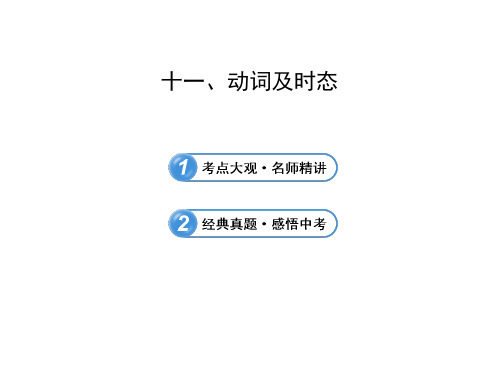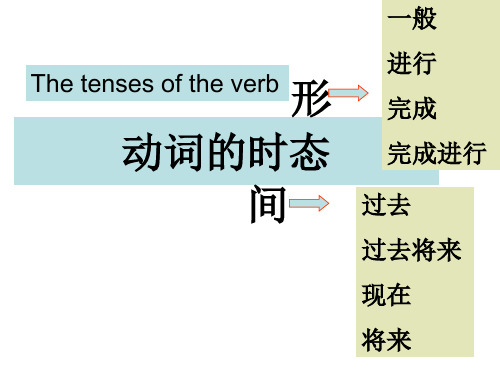最新初中英语语法知识—动词时态的图文解析(1)
初中英语语法动词及时态ppt课件

过去进行时 主语+was/were+v. -ing+其他
现在完成时 主语+have/has+过去分词+其他
中学阶段见到的其他时态 时态
构成
过去完成时 主语+had+过去分词+其他
过去将来时
现在完成 进行时
主语+would+动词原形+其他 主语+was/were going to+动词原形
主语+have/has+been+现在分词+其他
状语
【温馨提示】
(1)在含有时间状语从句的复合句中,延续时间较长的动作用过 去进行时,另一个短暂性动作用一般过去时。例如:
My pen dropped on the ground when I was walking in the park. 在公园散步的时候,我的钢笔掉到地上了。
(2)表示两个延续性动作在过去某一时刻同时进行,不考虑动作 的先后顺序,主句和从句的谓语动词都用过去进行时,连词常 用while。例如:
词
宾语,又分为及物动词和 不及物动词。
物动 run , walk , cry , 词 swim,fall,happen
连
系 连接主语和表示主语身份、be , seem , look , become ,
动
性质、状态的动词称为连 get , grow , feel , appear ,
系动词。
turn
day等频率副词或时间状语 month.
连用
我们每月都去看望刘叔叔。
用法
例句
表示客观事实或普遍真理 The sun rises in the east. 太阳在东方升起。
中考英语动词时态讲解 PPT资料共46页.ppt

[解题技巧] 以此立意的试题考查考生能否通过“过去 动作对现在的影响”这一含义判断出动词 用现在完成时态。
本题中“从去年至今我都没有见过我的老 师了”,对现在的影响是“我想念老师”, 强调了“没有看”这一动作对现在的影响, 选C。
11. “经历”所采用的现在完成时态。
—Would you like to see the film with me?
4.现在进行时的用法
1) 现在进行时表示说话时或近阶段正在进 行的动作,由“be十现在分词”构 成.例如: Look! The students are reading. (说话 时正在进行的动作)
We’re all working for the 2019 Olympics.(近阶段正在进行的动作)
he _______.
A. returned C. will return
B. returns (成都)
[解题技巧] 以此立意的试题考查考生是否掌握了when, until, as soon as等引导的时间状语从句和if 引导的条件状语从句中的一般现在时态。
本题中的主句是一个一般将来时态,as soon as引导的从句用一般现在时态与之呼 应,选B。
My friend will come tomorrow. Mr Green will teach us English next term. 注:Will you do…? 还可表示一种请求的 语气。
如: I can’t carry the box, will you help me? 2) “ to be going to十动词原形”,表示即将
David had a good time yesterday. I usually got up early when I was young. 2)表示过去经常发生的动作,也可用 “used to+do”表示。例如: My father used to smoke. Grandma used to be a history teacher 注意;used to表示过去常发生而现在不 再发生的动作或存在的状态。
初中英语语法动词时态详解 PPT课件 图文

中考模拟:
--Mike, who____football in the yard?
--Let me go and see. (2004顺义)
A.has played
B.will play
C.was playing
D.is playing
1.Look!What___the children___ over there? A.are;do B.are;doing C.is;do D.is doing 2.Those workers____here these months.
初中英语语法(1)
动词的时态
动词的时态结构歌谣
一 一般现在时,动词用原型; 般 单数三人称,动词加“s” 。 时 一般过去时,动词加“ed”。
I work. He works. I worked.
现在进行时,
进 am,is,are,-ing。
行 时
过去进行时, was,were,-ing。
例句:I am working.
10.I borrowed the book a week ago.I_h_a_v_e _k_e_p_t_the book for a week.
11.I bought the car a year ago. I_h_a_v_e _h_a_d_the car since a year ago.
1.--What a nice bike! How long____you____it?
--Just two weeks.(2004北京市中考)
A.will;buy B.did;buy C.are;having D.have;had
2.--How long have you____here? --Since 1997.
初中英语语法动词时态详解共32页

1、最灵繁的人也看不见自己的背脊。——非洲 2、最困难的事情就是认识自己。——希腊 3、有勇气承担命运这才是英雄好汉。——黑塞 4、与肝胆人共事,无字句处读书。——周恩来 5、阅读使人充实,会谈使人敏捷,写作使人精确。——培根
初中英语语法动词时态详解
11、获得的成功越大,就越令人高兴 。野心 是使人 勤奋的 原因, 节制使 人枯萎 。 12、不问收获,只问耕耘。如同种树 ,先有 根茎, 再有枝 叶,尔 后花实 ,好好 劳动, 不要想 太多, 那样只 会使人 胆孝懒 惰,因 为不实 践,甚 至不接 触社会 ,难道 你是野 人。(名 言网) 13、不怕,不悔(虽然只有四个字,但 常看常 新。 14、我在心里默默地为每一个人祝福 。我爱 自己, 我用清 洁与节 制来珍 惜我的 身体, 我用智 慧和知 识充实 我的头 脑。 15、这世上的一切都借希望而完成。 农夫不 会播下 一粒玉 米,如 果他不 曾希望 它长成 种籽; 单身汉 不会娶 妻,如 果他不 曾希望 有小孩 ;商人 或手艺 人不会 工作, 如果他 不曾希 望因此 而有收 益。-- 马钉路 德。
初中英语动词的时态和被动语态(共14张PPT)

延续性动词 be on be at/in+地点 be at/in+地点 be in/a member of be on have know keep
have a cold
have been to—have gone to
曾经去过(主语人在) 已经去了(主语人不在)
--I can’t find you these days.Where have you been?
be over be up be back be away (from) be here /there
非延续性动词 put on come/go to arrive/reach/get to join begin/start buy get to know borrow / lend
catch a cold
定义 表示过去某时间或某动作以前发生的动作。
结构 关健字
S+had+V过去分词
IwSr+heheaanlidzIner’det+aIVchh过ae去dd分let词hftemcoyupHnutar.sde+Sa+t Vh过om去分e词
by the time I came back,by the end of last term, when I got to the station,before he went to bed
表示过去某时刻或某阶段正在发生的动作。
was
1.SW+hawtawsna’st /hwe edroein’gt dwohinegn the UFO arrived?
结构 S+ weredoing 2W. Tahse/yWweerree+hSav+idnoginfugn…th?ese days.
初中英语语法—时态(28张) PPT课件 图文

(4)现在完成时与表示一段时间的for短语、since短语或从句等 时,应注意句中的谓语动词须是延续性的,而不能是非延续性动词,如 come→be here,go→be there,die→be dead,borrow→keep,buy→h ,join→be in,leave→be away,begin to study→study等。
6.过去进行时
(1)概念:表示过去某一时刻或某一时间段内正在进行的动作。 (2)构成形式:was/were+动词的-ing形式 ①表示往返、位移的动词的过去进行时常可用来表示过去将来时
时态 We wanted to tell her that the train was_leaving an hour later.
1.一般现在时
基本用法: (1)表示经常性、习惯性的动作; He always helps others. 他总是帮助别人。
时态 (2)表示现在的情况或状态;
He is a teacher. 他是个老师。 (3)表示客观事实和普遍真理。 The sun rises in the east. 太阳从东边升起。 构成形式:am/is/are或实义动词的原形(主语是第三人称单数时,动 词要用第三人称单数形式)。
时态 (2)构成形式:have/has+动词的过去分词。
(3)与现在完成时连用的时间状语有for a long time,recently,yet, lately,ever,never,already,since,by this time,before,just,in t past/last few years,since+过去的时间点,since+时间段+ago,since +从句(一般过去时)。
表示感觉的动词。如:see,hear等。 表示喜欢或厌恶的动词。如:like,love等。 表示希望的动词。如:want,would like等。
初中英语语法动词时态讲解ppt课件

(4) 过去进行时 1.表示过去某一时刻正在进行的动作.
e.g. He was doing shopping this time yesterday. We were having a discussion at that time. 2. 表示过去某一阶段正在进行的动作.
e.g. I have already sent him a card.
They have bought a new house. 常用的时间状语:already, just, yet 2. 表示从过去某一时间持续到说话时为止的动作或状 态, 常与 “ for+ 时间段 ” 或 “ since + 时间点 ” 的时间状语连用。
My brother has been in the army for a year. My brother joined the army one year ago.
但是: 不可持续动词的否定结构可以与” for + 时间段 ”
或since + 时间点” 连用。 e.g. I haven’t met my teacher of English for a year.
e.g. Do you see a plane in the sky? 注意:1) feel 可以用一般时和进行时表示说话时的感觉:
e.g. I am not feeling well today.
How are you feeling today?
I feel tired. 2) see, hear 有相应表示动作的动词 look at / listen to , 这些词可以用进行时
最新[中考英语]初中英语动词时态讲解(共37张ppt
![最新[中考英语]初中英语动词时态讲解(共37张ppt](https://img.taocdn.com/s3/m/df45a839e009581b6bd9ebd3.png)
2.表示普遍真理.如: The earth goes round the sun. 3.表示在现在时间里所发生的一个动作 .如:Here
comes the train. 4.在时间和条件状语从句中代表一般将来时 . 如:I'll go with you if you are free tomorrow.
5)
实义动词
4. 做非谓语动词的用法(指出现在谓语动词 之后的动词,它受前面谓语动词的限制) 动词会有三种形式:
1) 原型(do) 2) 动名词(doing) 3) 不定式(to do)
4)
实义动词
1) 用原型:
a) let sb.do b) make sb.do c) help sb.(to)do d) had better do
一般现在时
4. 例句
1) He goes to school on foot every day. 2) We often have supper at home. 3) She doesn’t do her work every Sunday.
现在进行时
结构:am/is/are + 动词的-ing形式 用法: 1.表示目前发生(进行)的动作(不指状态),常用时
- 1、下载文档前请自行甄别文档内容的完整性,平台不提供额外的编辑、内容补充、找答案等附加服务。
- 2、"仅部分预览"的文档,不可在线预览部分如存在完整性等问题,可反馈申请退款(可完整预览的文档不适用该条件!)。
- 3、如文档侵犯您的权益,请联系客服反馈,我们会尽快为您处理(人工客服工作时间:9:00-18:30)。
一、选择题1.They the English role play for the show last night.A.will practice B.practiced C.is practicing D.have practiced2.—Look, Tom's parents look so sad.—Maybe they what's happened.A.knew B.have known C.has known D.will know 3.—Surprise! Cindy is singing in the concert.—But she ______.A.will refuse B.refusedC.refuses D.has refuse4.—Mom, can you teach me how to pronounce the words?—Wait a minute. I ________.A.am cooking B.cookC.cooked D.will cook5.— Look at my new watch.—Well, it’s so cool! When and where________you buy it?A.Do B.will C.did D.Are6.I________ cleaning my room.It’s clean now.A.have finished B.finished C.finish D.will finish7.It ________ heavily when I left the movie theater.A.rains B.was raining C.is raining D.will rain8.Dick __________ in America, but he has been ___________ Chinese food since he moved to China.A.used to live; used to eatingB.is used to live; used to eatC.is used to live; used to eatingD.used to living; used to eat9.My mother will be very angry with me when she out where I have been.A.finds B.found C.will find D.has found 10.— Morning, Mike! Did you sleep well last night?— Yes. I went to bed at 9:30 because there ______ a math test this afternoon.A.was B.will be C.is going to have11.—I don’t understand why you didn’t go to the lecture yesterday afternoon.—I’m so sorry. But I my homework.A.had done B.was doing C.would do D.am doing12.Becky took a photo of her friends while they _________ computer games.A.play B.are playing C.were playing D.have played 13.Miss Smith in our school since five years ago.A.teaches B.taught C.has taught D.is teaching14.—I can’t stand such loud music!— Sorry, I __________ it off.A.have turned B.turn C.turned D.will turn 15.— Look after yourself on your way to Gungzhou,dear.— OK, mom.I will call you________get there.A.as soon as B.so that C.because16.Jack ______ a good rest as soon as he finishes the exam.A.has B.had C.is having D.will have17.—I can’t find Peter. Where is he?— He ______ tea in the living room.A.drinks B.drinking C.is drinking D.drink18.The water ______ cool when I jumped into the pool for morning exercise.A.was felt B.is felt C.felt D.feels 19.—The surgeon hasn’t come back, has he?—_______, for he _______ Australia since last week and will be back in a week.A.No; has been in B.No; has gone to C.Yes; has gone to D.Yes; has been in 20.—Did you hear the strange noise next door around 9 o’clock last night?— No, I ________my favourite film in my bedroom.A.watch B.watched C.am watching D.was watching 21.—How did the accident happen?—You know, it was difficult to see the road clearly because it________.A.was raining B.has rained C.is raining D.will rain 22.Don’t t alk! The baby ________.A.sleeps B.is sleep C.sleeping D.is sleeping 23.Look! All my classmates ___________ on the playground.A.are running B.ran C.were running D.run24.----Can you tell me how long you_______ the Huawei mobile phone,Mr. Zhang.----Nearly a year. It works very well.A.will buy B.have had C.have bought D.had had25.Doctor Ray, as well as other scientists __________ trees for nearly 15 years, but they know only a little about them.A.study B.studies C.has studied D.have studied【参考答案】***试卷处理标记,请不要删除一、选择题1.B解析:B【解析】句意:昨天晚上为了演出他们练习了英语角色扮演。
考查一般过去时。
根据提示词last night可知时态用一般过去时,“练习”practice,其过去式为practiced,故答案选B。
2.B解析:B【解析】【分析】【详解】句意:——看,汤姆的父母看起来很伤心。
——或许他们已经知道发生了什么事。
考查现在完成时。
A. knew一般过去时;B. have known 现在完成时我;C. has known现在完成时;D. will know一般将来时。
根据句意“——看,汤姆的父母看起来很伤心。
——或许他们已经知道发生了什么事。
”可知know的动作发生在过去,对现在造成一定的影响,故时态用现在完成时,其构成为:have/has+动词的过去分词,主语是they,助动词用have,know的过去分词是known;故答案选B。
3.B解析:B【解析】【分析】【详解】句意:——好意外!辛迪正在音乐会上唱歌。
——但是她(过去)拒绝。
考查一般过去时。
根据句意:好意外!辛迪正在音乐会上唱歌。
结合but,可知Cindy之前是拒绝的。
所以用一般过去时。
故答案为B。
4.A解析:A【解析】【分析】【详解】句意:——妈妈,你能教我读这些单词吗?——等会儿。
我正在做饭。
考查动词的时态,am cooking现在进行时;cook动词原形;cooked过去式;will cook一般将来时。
根据句意可知这里应该用现在进行时表示说话时正在做什么,故选A。
5.C解析:C【解析】【分析】【详解】句意:——看看我的新手表。
——嗯,太酷了!你是什么时候在哪里买的?考查助动词,观察句子,这是一个特殊疑问句,特殊疑问句=疑问词+一般疑问句。
当谓语动词是实义动词是要借助助动词Do/does,若句子中由be动词、情态动词,直接提前即可。
结合句子,这里的谓语动词是buy,那么要借助动词,排除BD。
结合句意,buy这个动作应该发生在过去,那么助动词应该用过去式did,故选C。
6.A解析:A【解析】【分析】【详解】句意:我已经打扫完我的房间,现在干净了。
考查动词时态,A. have finished现在完成时;B. finished过去式;C. finish动词原形;D. will finish一般将来时。
结合句意,这里表达的是过去的动作对现在造成的影响,应该用现在完成时,故选A。
7.B解析:B【解析】【分析】【详解】句意:我离开电影院时,天正下着大雨。
考查时态。
A. rains动词三单形式;B. was raining过去进行时;C. is raining现在进行时;D. will rain一般将来时。
观察句子,这是一个when引导的时间状语从句,注意到从句中使用的是一般过去式,再结合句意,表达的是过去某一时间段正在发生的动作,应该用过去进行时,故选B。
8.A解析:A【解析】【分析】【详解】句意:迪克过去住在美国,但自从搬到中国后,他就习惯了吃中国菜。
